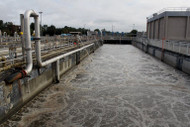Biological vs Chemical Wastewater Treatment System: Which is Better?
Posted by David Cannon on 9th Nov 2019

Water conservation, environmental conservation, and wastewater treatment are all related and should go hand in hand. Conserving water is the need of the hour as it is a crucial element for life to sustain on earth. Wastewater treatment offers access to used but clean water for domestic and commercial usage, except for drinking. Treating wastewater from industries is crucial as it can otherwise be toxic to humans and harmful to the environment. These are some of the reasons for the growth of the wastewater industry. Now, the crucial partâ wastewater can be treated chemically as well as biologically. So, which one do you think is better? You may want to think that the biological process would be better and more ecofriendly than chemical. However, each process has its pros and cons and this largely depends upon the type of industry under consideration. This post discusses a detailed, comparison of biological and chemical wastewater treatments to help you decide the right one for your industrial facility.
Why Wastewater Treatment is Essential?
Certain industries such as chemical, oil & gas, pharmaceutical, petroleum, and so on, release several pollutants into the environment as a byproduct. These are mostly in the form of chemical compounds, gases, smoke, and so on. Aside from this, a large amount of wastewater is also released. At times, these chemicals are mixed with water as part of their cleaning processes. So, it is essential to nullify the harmful effect of this water before it is released into the environment or sent for further processing at municipal level wastewater treatment facilities.
How to Decide the Wastewater Treatment Methodâ Whether Chemical or Biological?
Whether to opt for biological or chemical wastewater treatment would really depend upon your industry. Here are a few comparative pointers which would help you make the right decision:
- Biological treatments are primarily of two types- suspended growth and attached growth. Moving Bed Biofilm Reactor (MBBR) is used in the attached growth process. Activated sludge is used in the suspended growth process.
- Biological treatments include aeration, formation of activated sludge, mycoremediation and phytoremediation of wastewater, and so on. These are done using various bioreactors and filters. The treatment pattern could be aerobic or anaerobic.
- Basic biological wastewater treatments are inexpensive and mainly work for wastewater which contains biodegradable pollutants. They are used to remove soluble and suspended organic contents. They can get expensive with the use of technology and controls to monitor pressure, temperature, aeration, pH, and so on. So, this may seem like an initial investment, but it turns out to be a cost-effective option in the long run.
- Chemical treatments are required where there are toxic substances involved. These include soluble metals such as nickel, mercury, and lead among others. These toxic contents are treated with chemicals such as sodium hydroxide or calcium hydroxide to form insoluble metal hydroxides, which precipitate and separates out of water.
- Chemical treatments are a tad expensive and getting the right quantity of reactant is crucial. These treatments require, tanks, filters, pumps, mixers, and so on.
- The easiest illustration of biological treatments would be decomposition of kitchen and garden waste with the help of bacteria. So, basically these are all biodegradable substances containing proteins, edible fats, carbohydrates, minerals, and at times hydrocarbons.
- Aside from precipitation of toxic substances, chemical treatments include coagulation and flocculation processes to further remove the finer contaminants. These processes help the fine particles combine with the heavy ones, which separate out of the water.
- Ion exchange and disinfection processes are also a part of the chemical wastewater treatment. Chlorination of water is a simple disinfection process. Ion exchange makes the water potable, and hence is utilized for applications that require pure water.
- The power consumption by a biological system could be more than a chemical one, and it may be challenging to set the former in remote areas.
By and large, the type of treatment- whether chemical or biological will depend on these parameters:
- Features and characteristics of the wastewater including toxicity
- Flowrate
- Level of contaminants before the treatment
- Level of contaminants acceptable post treatment
- Your budget
- Land and resources available to set up and run the facility.
By now, you may have an idea about both biological and chemical wastewater treatments. Whichever one you choose, it is imperative to have well-engineered pumping systems, meters, and other equipment. If you require new chemical pumps or water filtration equipment, chemical feed systems make sure you approach reliable suppliers such as Cannon Water Technology. They have a variety of brands that meet all the required quality standards.
